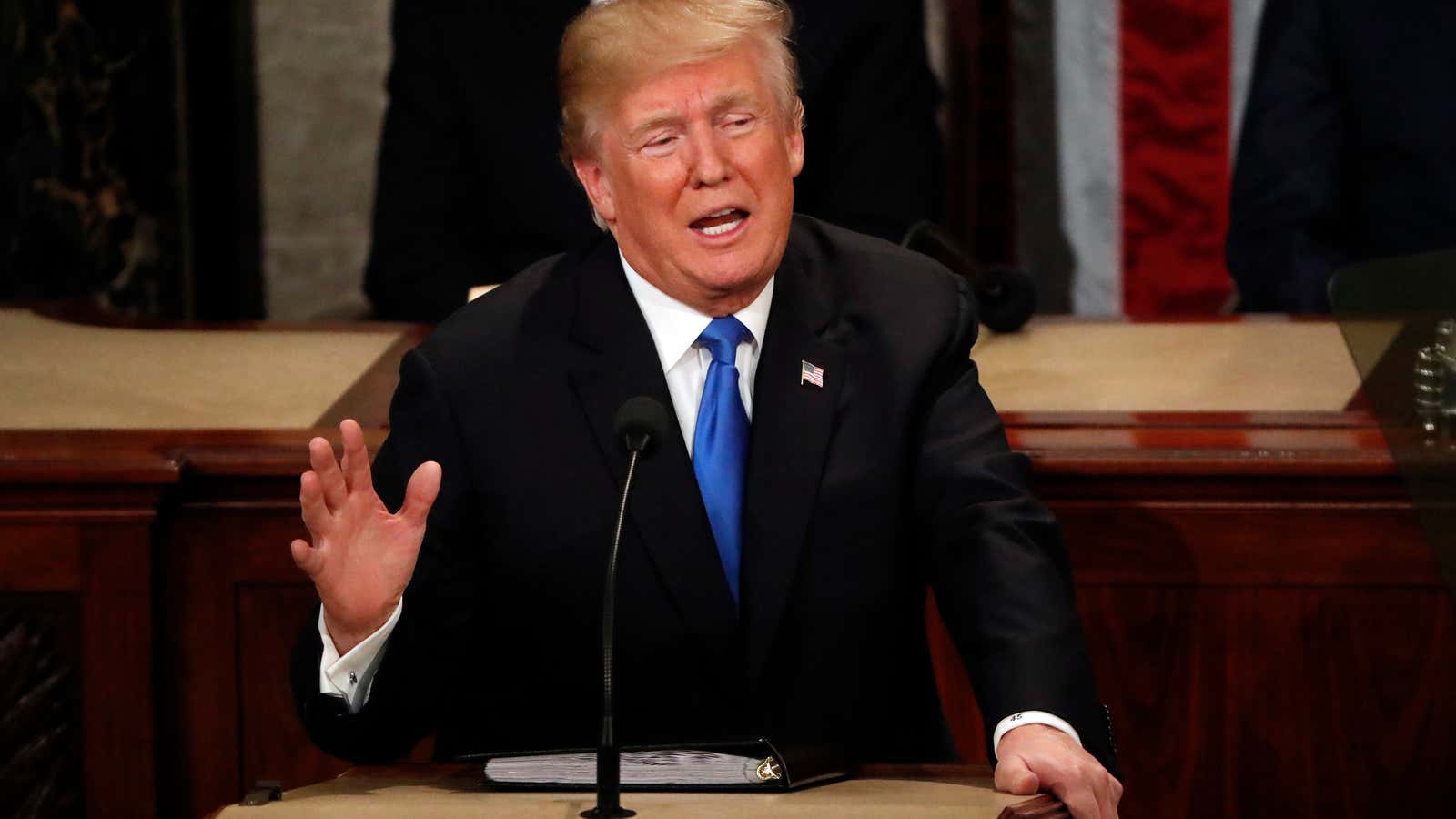Donald Trump appears to be on something of a roll. Despite the, shall we say, stormy start to the year, his back-to-back appearances at the World Economic Forum in Davos and his State of the Union address projected a man committed to a national reawakening without alienating the entire rest of humanity.
Arriving at Davos on the heels of announcing tariffs of Chinese appliances and solar panels, few seemed perturbed by this mild protectionism compared to the trade wars trumpeted during his campaign. Indeed, one term barely uttered by the “old” Trump that is now a mainstay in his vocabulary is “reciprocity,” the foundation of all meaningful diplomatic and economic ties and, quite frankly, the argument Europeans have been pounding China on for years as well.
He also did what heads of state are supposed to do at Davos: sell his country. Had French president Macron stuck around another day, he would surely have been jealous at the throngs surging to hear Trump. Instead of platitudes, the US president was remarkably on message: “There has never been a better time to invest in America.”
In fairness, the US has for several years already re-established itself as the world’s premiere destination for foreign investment in energy, commercial real estate, money markets and so forth. But the tax bill certainly added wind to his sails.
The state of the union address also had Reagan-esque flourishes, denouncing North Korean despotism—complete with victims of its brutality seated as props in the audience—but without threatening to annihilate the regime and provoke a catastrophic Third World War.
Combine these olive branches and policy breakthroughs with a $1 trillion infrastructure overhaul and merit-based immigration reform—two upcoming legislative priorities—and you have the makings of an America that might at a minimum steer clear of recessionary scenarios and at a maximum actually create decent paying jobs rebuilding the country. If Apple and Amazon, Walmart, and GE continue to play ball with Trump, perhaps it’s not a stretch to foresee the national median income rise after a worrying period of decline, indicating a potential shift from plutocracy to broad-based growth.
The world should take notice—even if changes almost nothing the rest of the world does.
After all, China won’t—and shouldn’t—slow down its Belt & Road Initiative, which is a super-sized Marshall Plan for dilapidated post-colonial and post-Soviet Asia, smoothing connectivity to its largest trading partner: Europe. Well before Trump was elected, EU countries began to pivot to Asia, seeing it as a massively growing market for their industrial exports. Both ends of Eurasia are enthusiastically underwriting the Asian Infrastructure Investment Bank (AIIB) for precisely this reason. Even if Europhile Justin Trudeau of Canada becomes the American president, it wouldn’t derail this Euro-Asian convergence.
This is just one significant example of how irrevocably multipolar the world has become, not only structurally but also psychologically. Europe is putting itself first, as is Asia. Even Arabs have lost all respect for Washington and are plotting Syria and Iraq’s future this week in Sochi, rather than at Camp David.
Seen in this broader context, there is nothing inherently wrong with “America First.” The error lies in conflating a valid “nation building begins at home” ethos with the antiquated 1990s mantra of “the world is waiting for American leadership.” Globalization has many drivers, and America is no longer the consumer of last resort. Fifty-eight percent of Asian trade is within Asia, meaning even countries that before the financial crisis depended on exports to the West no longer do. Asians don’t want escalation with North Korea; Europeans want to trade with Russia and Iran. I can predict with total certainty that in this age of universal awakening, they will get their way.
This argument is hardly new. Ten years ago this week I wrote a cover story for the New York Times magazine (adapted from my book The Second World) titled “Waving Goodbye to Hegemony.” In the midst of the Iraq and Afghanistan insurgencies, I wrote, “We have learned the hard way that what others want for themselves trumps what we want for them—always.” Let us remember this each time we naively pretend—as so many liberals did upon Obama’s election in 2008—that a new American president, even one the world likes, is tantamount to a once in a lifetime celestial event. Trump is a curiosity, one fortunately less dangerous that he initially appeared. Whoever comes after him may be a relief to many, but probably won’t be as big a surprise (unless it’s Oprah). Either way, world order is something far deeper than any one man, even the American president.
If America wants a serious grand strategy for this brave new landscape of diffused power and inter-regional networks—rather than the hodgepodge of jocular statements and unprioritized risks that constitutes the administration’s recent national security strategy—then it must lead with influence through connectivity, not containment. That means American oil companies selling more energy to Asia and Europe, American banks financing more trade and M&As around the world, and American tech companies laying more fiber-optic cables and buying more telecoms abroad. If America doesn’t do it, others will.
You may or may not get used to Trump as president, but it’s long overdue that we get over ourselves. In the real world, nobody has time for America’s reality show politics.
